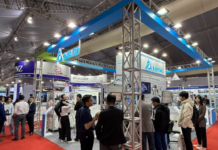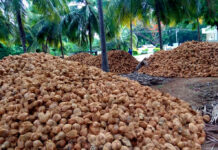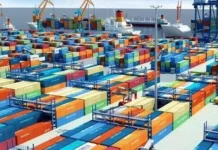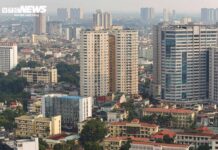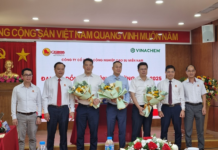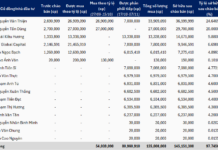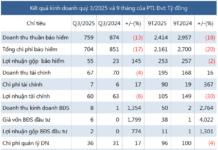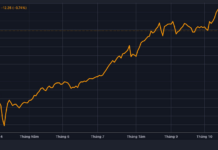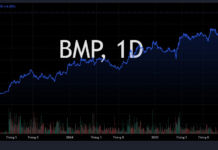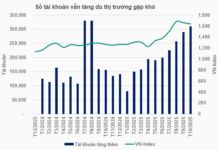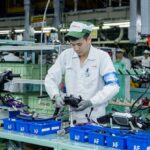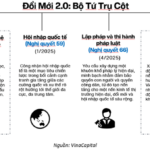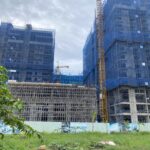During the visit of State President Luong Cuong to the Arab Republic of Egypt from August 3 to 6, 2025, on August 4, 2025, the Ministry of Industry and Trade’s delegation, headed by Deputy Minister Phan Thi Thang, met and worked with the Minister and two Deputy Ministers of Investment and Foreign Trade of Egypt.
At the meeting, Deputy Minister Phan Thi Thang expressed her delight at the achievements in bilateral relations and affirmed that the Vietnamese Ministry of Industry and Trade has always attached importance to and highly appreciated Egypt’s leading role and position in North Africa in particular and Africa in general.
Egypt is currently Vietnam’s largest trading partner in North Africa, with a trade turnover of over US$472 million in 2024.
According to statistics from the Ministry of Industry and Trade, in 2024, the total import and export turnover between Vietnam and Egypt reached US$472.6 million, up 9.4% compared to 2023.
In the first six months of 2025, the import and export turnover between Vietnam and Egypt reached US$266.9 million, up 8.0% over the same period last year, of which Vietnam’s exports to Egypt reached US$266.9 million, up 8.0%.
Vietnam’s main export items to Egypt include coffee, phones and accessories, means of transport and spare parts, computers, electronic products and components, seafood, and pepper…
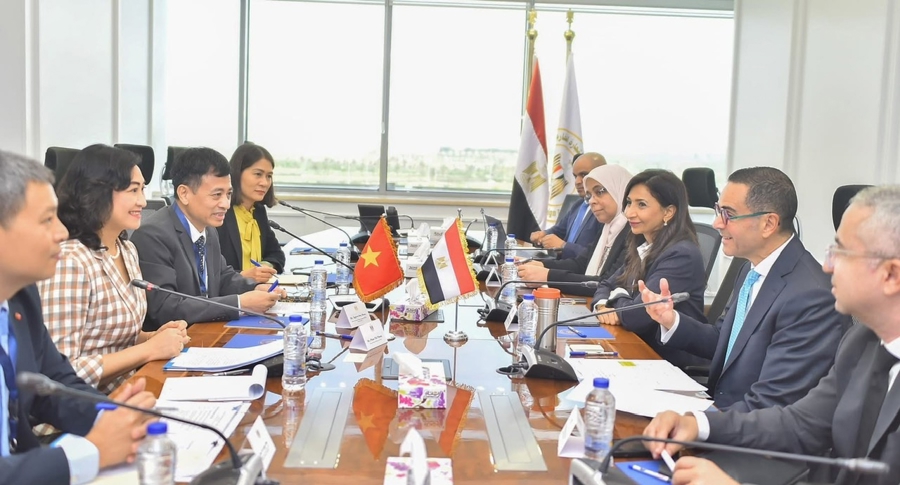
Deputy Minister Phan Thi Thang stated that the import and export goods structure between the two countries is not competitive but complementary. Therefore, there remains much potential and scope to further promote the scale of economic and trade cooperation, including cooperation in the fields of industry, agriculture, investment, and logistics.
“As the two agencies in charge of economic and trade cooperation, the two Ministries have a lot to do to bring the economic and trade cooperation relationship in line with the bilateral relationship in the coming time,” emphasized Deputy Minister Thang.
Based on Vietnam’s proposal, the two sides agreed to strengthen coordination in organizing trade and investment promotion activities, thereby contributing to expanding the scale and aiming for a balanced bilateral trade balance.
The Egyptian side informed that it plans to organize a business delegation to Vietnam in 2025 and proposed that the Ministry of Industry and Trade coordinate to organize bilateral trade and investment promotion activities.
Minister Hassan El Khatib appreciated the friendly cooperative relations between the two countries since the establishment of diplomatic relations (1963) until now and highly appreciated Vietnam’s economic development in recent years.
At the same time, Minister Hassan El Khatib introduced Egypt’s advantages and potential for cooperation, such as its important geographical location, many economic agreements signed with the European Union and African countries, potential for developing logistics, renewable energy, oil and gas, and industries (textiles, fertilizers, chemicals…).
At the meeting, the two sides agreed to establish a Joint Working Group on the feasibility study of the Vietnam-Egypt FTA, which is in charge of studying and evaluating the benefits that the FTA can bring to both sides, contributing to promoting trade and investment between the two countries towards balance.
Vietnam and Egypt also agreed to coordinate and hold the 3rd meeting of the Bilateral Sub-committee on Trade and Industry Cooperation this year (expected in the fourth quarter of 2025) in Vietnam to exchange specific cooperation contents in the fields of trade and investment in the industry.
According to the Vietnam Trade Office in Egypt, as Egypt has advantages in agricultural production, this market has a great demand for importing many other agricultural support products, such as agricultural products (coffee, pepper, cashew nuts, coconut meat), seafood (basa fillets, frozen shrimp, canned tuna), garments, textiles and footwear, rubber, electrical and electronic equipment, and machinery.
On the other hand, Egypt’s main exports to Vietnam are agricultural products (cotton fiber, citrus, frozen strawberries, honey, cheese), asphalt plastic, chemicals, and some pharmaceuticals.
The current difficulty for Vietnamese exporters to this market is the instability in the Middle East-Africa region and policies.
Wealth Management: The Art of Standing Apart
In the elite world of high finance, wealth is a symbol of stature, a source of pride for one generation and a legacy for the next. Effective wealth management requires not only rational decision-making but also a profound understanding of philosophical tenets, unwavering commitment, and, most importantly, an innate sense of synergy with the elite.
“Vietnam’s FDI Appeal Remains Unshaken by Tariff Turbulence”
Although the US administration has tweaked some tax policies amidst escalating trade tensions with China, foreign direct investment (FDI) into Vietnam, particularly in high-tech and ancillary industries, has not witnessed significant changes. Experts attribute this stability to Vietnam’s enduring competitive edge in the global supply chain, which transcends the transient effects of international tax policies.
“Celebrating 80 Years of Independence: SHB Evokes the Spirit of ‘Happiness as a Vietnamese’”
Celebrating 80 years of the August Revolution (August 19, 1945 – August 19, 2025) and the National Day of the Socialist Republic of Vietnam (September 2, 1945 – September 2, 2025), SHB introduces a series of activities themed “Happiness is Being Vietnamese.” The highlight of these activities is a gift package for customers, spreading happiness and national pride to all customers and the public.
The Innovation Renaissance: From Policy to Practice
Vietnam is embarking on an era of Doi Moi 2.0, a rapid transformation from policy statements to tangible outcomes, as evidenced by the 34 laws passed in June 2025, along with far-reaching administrative reforms. In the coming months, VinaCapital anticipates an accelerated pace of infrastructure investment disbursements, particularly in the transportation and energy sectors. Similarly, the real estate sector is expected to continue benefiting from recent policies that unblock stalled projects.
Unlocking Capital: Vietnam’s Public Investment Disbursement Reaches an Estimated VND 388 Trillion by July End
As of July 31, 2025, the Ministry of Finance estimates that disbursement since the beginning of the year stands at VND 388,301.15 billion, representing 39.45% of the plan and 43.9% of the plan assigned by the Prime Minister. This demonstrates a significant improvement compared to the same period in 2024, when disbursement reached only 27.76% and 33.8% of the respective plans.


